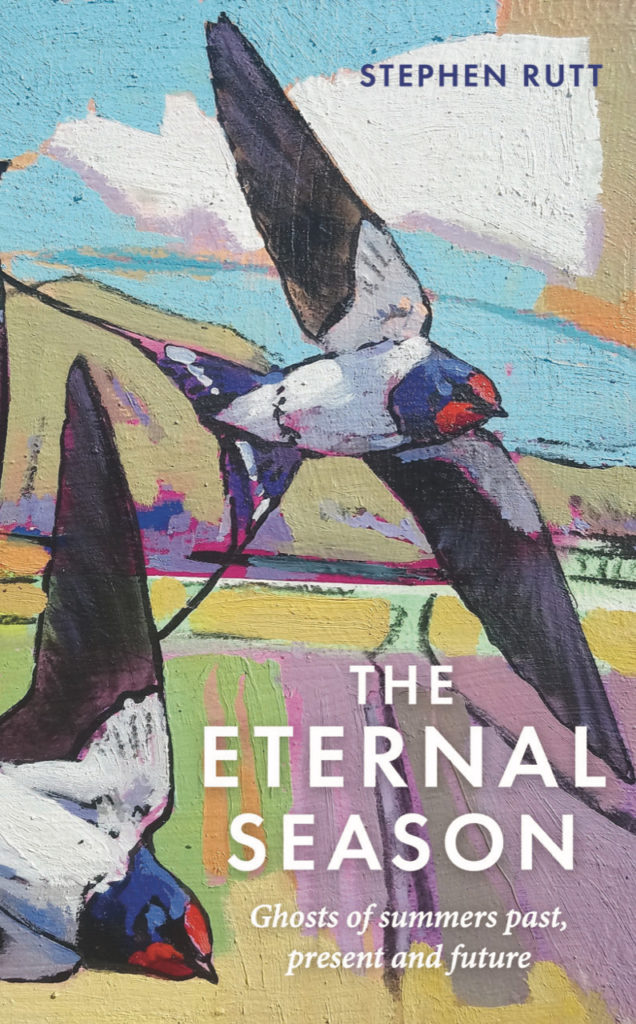Stephen Rutt’s ‘The Eternal Season: Ghosts of summers past, present and future’ — an evocative exploration of the changing nature of a British summer — is published later this week by Elliott & Thompson. Read an extract from Chapter 6, titled ‘Silence Descends’, below.

High summer is a time of silencing. Individual by individual, species by species; the task of territory holding and finding a mate has been completed. Feathers are worn and in need of moulting, young are in need of feeding, the hot sun beats down on opaque leaves and birds move to the middle of bushes, deep in the cover or high in the tree canopy. Each species falls quiet or irregular. The exuberance of life before has become almost distracted, as if July is a season within a season: the time between the singing and the pre-migration activity, when birds seem to vanish. It is an avian solstice, when the old bird of spring gets ready to renew itself, to become the bird of autumn, ready to head south.
It is the worst month for birding and my attentions turn to other fields of natural history. But in town there is still bird life to be seen; while I am walking the streets of Dumfries and the backways on the edge of town, the hitting swallows and housemartins hold my attention, the constant motion hypnotic, a reminder of the energy that came before the summer pause.
Back home we try to reorient ourselves in our surroundings. The route is familiar, the weather as I remembered it. Walk out of the hat, down through the cemetery to the river and cross the small bridge over the Nith. A choice: we turn downriver, follow the bank past the cricket pitch and the allotments towards the quay. We walk alongside the scrubby field, set aside for the river to hood at high tides, behind the small skate park. It’s a walk we’ve done countless times since we came to Dumfries, our fresh-air constitutional, our autopilot walk, while our heads can be elsewhere. This evening has a deep grey sky and a slight breeze threatening squalls of rain. This is not a walk for fun, just a walk to get out of the house. I do not bring my binoculars.
There’s no need to think until we get to the scrubby field. Rosebay willowherb flourishes here on land without an official purpose, where it can grow without permission. It grows in thick stands, blooming with four pink petals on each flower, a spread of flowers around the stem. The stem is a wick that burns pink as the plant flowers upwards. On its own, one is a nice splash of colour. In this field they grow in patches but with a density that paints the green field in bands of hot pink. But we are not quite there yet. They are just flaring into flower now, a week or two later than they are in England.
A few minutes further down the path and my ears engage. A familiar buzzing is coming from the field. A grasshopper warbler, singing, though singing is perhaps not the correct word because it is more like the hum of a pylon than any noise a bird might make. It is a constant and continuous metallic ticking, an unspooling fishing reel of sound. No variation. No pausing for breath. No change of pitch or note or pause, only volume when it moves its head, throwing the noise in different directions. This is familiar for me: I hang about in the habitats they like, the wet and the lush and overgrown. It is more familiar than the sight of them, for grasshopper warblers are less famous among birders for their improbable song than their invisible habits.
Another squall of rain. The warbler gets louder. I curse not having my binoculars.
Grasshopper warblers have spent nearly the entire twenty-first century on the red list of conservation concern as their numbers in Britain dwindle. It’s hard, with such a secretive species, to work out how many there are. The method is to count the singing males: in 2016 there were 12,000 holding territories. Fields like this on the edge of town, where the grass grows long and the flowers are thick in summer, let them hold territories after their migration from West Africa, hidden in the depths, singing unseen – the way they like it, one of the curious species that sings all summer long.
The rain gets harder. We cut the walk short. The warbler keeps singing.
*
‘The Eternal Season’ is published this Thursday. Order a copy here, via our new Bookshop.org page.